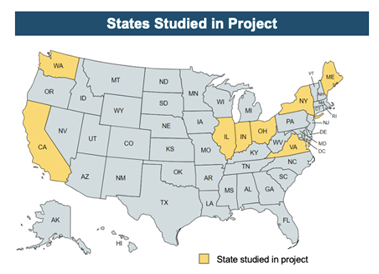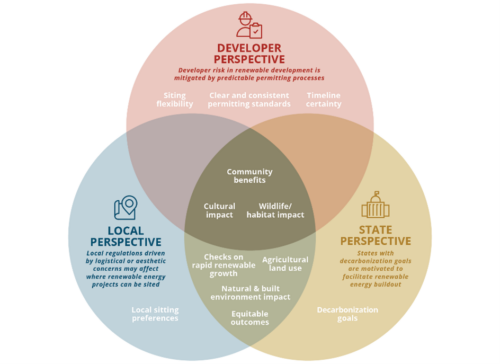
Deployment of renewable energy projects at scale is critical to the U.S. achieving its climate goals. Over the past several years, barriers to deploying renewable energy projects have shifted from technical and economic in nature to institutional and social barriers at regional, state, and local levels. Renewable energy projects have encountered institutional barriers and delays progressing through the regional, state, and/or local-level processes required for obtaining the necessary approvals. A variety of social barriers, stemming from local as well as organizational opposition, can also block project development. In a new study, E3 examined these many impediments to renewable deployment as well as avenues for overcoming siting and permitting obstacles.
In this study, commissioned by the Clean Air Task Force (CATF), Natural Resources Defense Council (NRDC), and The Nature Conservancy (TNC), E3 developed recommendations for renewable siting and permitting processes that can support deployment of renewable energy projects at scale. E3 evaluated siting and permitting policy and renewable development in eight states that reflect a diversity of permitting policy structures, renewable resource availability, and renewable deployment to date. Through research and stakeholder interviews, E3 developed learnings from past renewable permitting and siting processes and deployment in these eight states and applied them to develop permitting process best practices that can be applied to states and counties throughout the U.S. regardless of the status of their current permitting process. E3 also outlined key considerations to maximize community benefits and minimize environmental impacts from renewable energy deployment, focusing on recommendations that would support renewable deployment while ensuring positive social and environmental impacts. Findings from this study can be used as a reference by policymakers, advocacy organizations, and others as states consider permitting processes as part of the path to accelerating renewable deployment.

The study found that the overarching framework that best supports the development of renewable energy is a one-stop shop for permitting. Furthermore, permitting decisionmakers should have clear and consistent requirements to issue permits in a timely manner if a project meets criteria around siting, community engagement, and community benefits. The building blocks for ensuring benefits for host communities and the environment are early and frequent community engagement, providing financial or other material benefits to local communities, and consideration of environmental impacts and mitigation to the extent possible. Various policies and design elements, encompassing a range of effort levels and potential impact, can be incorporated into state and local renewable siting and permitting processes to support renewable deployment at scale while minimizing environmental impact and maximizing social benefits.

E3 would like to thank CATF, NRDC, and TNC for commissioning the study. We would also like to thank the interviewees who provided first-hand accounts of barriers and challenges to deploying renewable energy projects and experiences with specific policy interventions. Interviewees included project developers, permitting consultants, state permitting staff, county associations, and renewable energy advocates.


